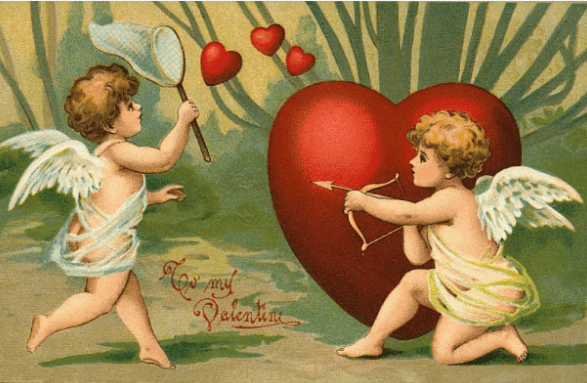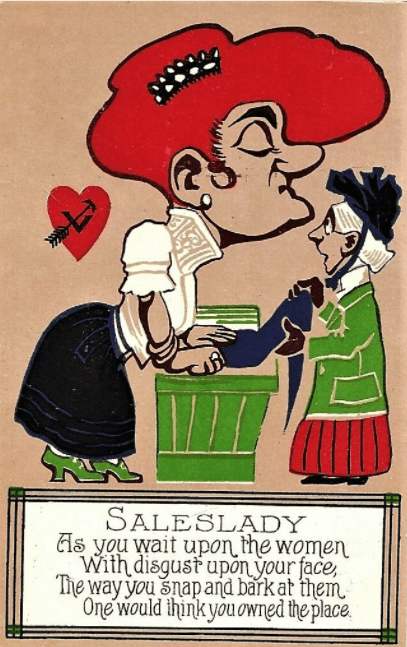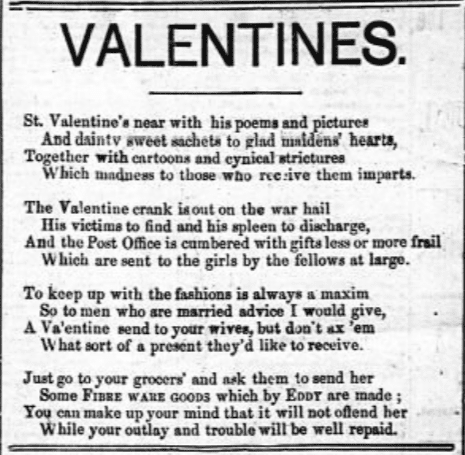Valentine’s Day is the favorite holiday of all who are in love. People have been celebrating it since ancient times. The first mention of Valentine’s Day was in the 15th century when the Duke of Orleans sent Valentine’s Day greetings to his wife, whom the British took prisoner during the battles of Agincourt. Another mention of Valentine’s Day was in the 17th century by Shakespeare in his play Hamlet. In olden times, all lovers were waiting for Valentine’s Day in Ottawa. Find out more at ottawanka.com.
The first mention of Valentine’s Day in Ottawa

An advertisement in The Packet newspaper, Bytown, 1848
Valentine’s Day was a long-anticipated holiday for all those in love around the world at any time. The first mention of the holiday of love in Ottawa newspapers dates back to 1848 when Ottawa was still called Bytown.
Also, for Valentine’s Day, a local Baytown resident who was running a business selling tables and tableware was advertising in the newspaper. He advertised his vast range of Valentine’s cards, which customers could buy both in several pieces and by one.
For Valentine’s Day in 1850, the local Bytown newspaper published a poem about Cupid on the front page, dedicated to one of the town’s residents.
Valentine’s cards exchange as a tradition in Ottawa
By the 60s of the 19th century, Valentine’s cards had become a true tradition in Ottawa. For Valentine’s Day, town residents were buying Valentine’s cards massively, signing them for their loved ones and sending cards to them. In 19th century Ottawa, a postcard could be sent for one cent for delivery within the town. The enormous workload of the postal worker was at Christmas, when everyone sent each other greeting cards, as well as on Valentine’s Day when they confessed their love. Therefore, to ensure that postcards were not lost on holidays and were delivered on time, in the 1870s, the town newspaper started offering residents to pay all postage in advance.
Where was it possible to buy Valentine’s cards in 19th-century Ottawa?
Back in 19th century Ottawa, the town’s stationery shops specially prepared products for sale before Valentine’s Day. Valentine’s cards, gifts and other items for confessions of love appeared in shop windows. Customers could buy all kinds of Valentine’s cards, from the most sentimental to the most comical. The price of cards also varied, from one cent to as much as seven dollars. For a love confession, a postcard was chosen very carefully so as not to offend or traumatize the feelings of the better half. In 19th-century Ottawa, such shops were located on Sparks Street and Rideau Street.

A sample of a 19th-century Valentine’s card

Comic Valentine’s card, 1910
How did Ottawans choose their Valentine’s cards?
In the 19th century, buying a Valentine’s Day card was considered quite an important thing. Many people who wanted to confess their love were too shy to buy Valentine’s cards and made a long decision while standing in front of the shop. They could not just walk around and look at them in the very shop. The only way to buy Valentine’s card was to approach the seller and voice your requirements and vision of the card. Just after that, the seller would take it out.
Valentine’s Day parties

A Valentine’s Day poem published in Ottawa Journal, 1893
By the 1990s, a greeting card had become a common way of showing feelings and celebrating Valentine’s Day. Thus, in the 1890s, other options for celebrating Valentine’s Day began to emerge in Ottawa.
In 1894, the town newspaper began to feature entertaining ideas on how to have fun on Valentine’s Day and how to throw a party. The paper suggested writing party invitations to acquaintances on a note sheet, decorating it with hearts and festive ribbons. The 19th-century party itself involved a two-hour card game called Hearts, at the end of which prizes awaited the winners. The prizes, respectively, were themed on Valentine’s Day. For women who won, a heart-shaped photo frame and a heart-shaped pin cushion, while for men, it was a broom. A woman who lost was awarded heart candles.’
After the card game, the party served dinner:
- Heart-shaped sandwiches
- Heart cakes
- Ice cream
- Heart-shaped cookies.
